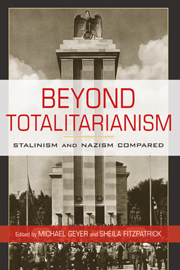1 - Introduction
After Totalitarianism – Stalinism and Nazism Compared
Published online by Cambridge University Press: 05 June 2012
Summary
The idea of comparing Nazi Germany with the Soviet Union under Stalin is not a novel one. Notwithstanding some impressive efforts of late, however, the endeavor has achieved only limited success. Where comparisons have been made, the two histories seem to pass each other like trains in the night. That is, while there is some sense that they cross paths and, hence, share a time and place – if, indeed, it is not argued that they mimic each other in a deleterious war – little else seems to fit. And this is quite apart from those approaches which, on principle, deny any similarity because they consider Nazism and Stalinism to be at opposite ends of the political spectrum. Yet, despite the very real difficulties inherent in comparing the two regimes and an irreducible political resistance against such comparison, attempts to establish their commonalities have never ceased – not least as a result of the inclination to place both regimes in opposition to Western, “liberal” traditions. More often than not, comparison of Stalinism and Nazism worked by way of implicating a third party – the United States. Whatever the differences between them, they appeared small in comparison with the chasm that separated them from liberal-constitutional states and free societies. Since a three-way comparison might entail associating liberal democracy with its opposite, if only by bridging the chasm between them through the act of comparison, this procedure was commonly shunned – or deliberately used to suggest that, despite it all, the three regimes were not so far apart.
- Type
- Chapter
- Information
- Beyond TotalitarianismStalinism and Nazism Compared, pp. 1 - 38Publisher: Cambridge University PressPrint publication year: 2008
References
- 3
- Cited by



